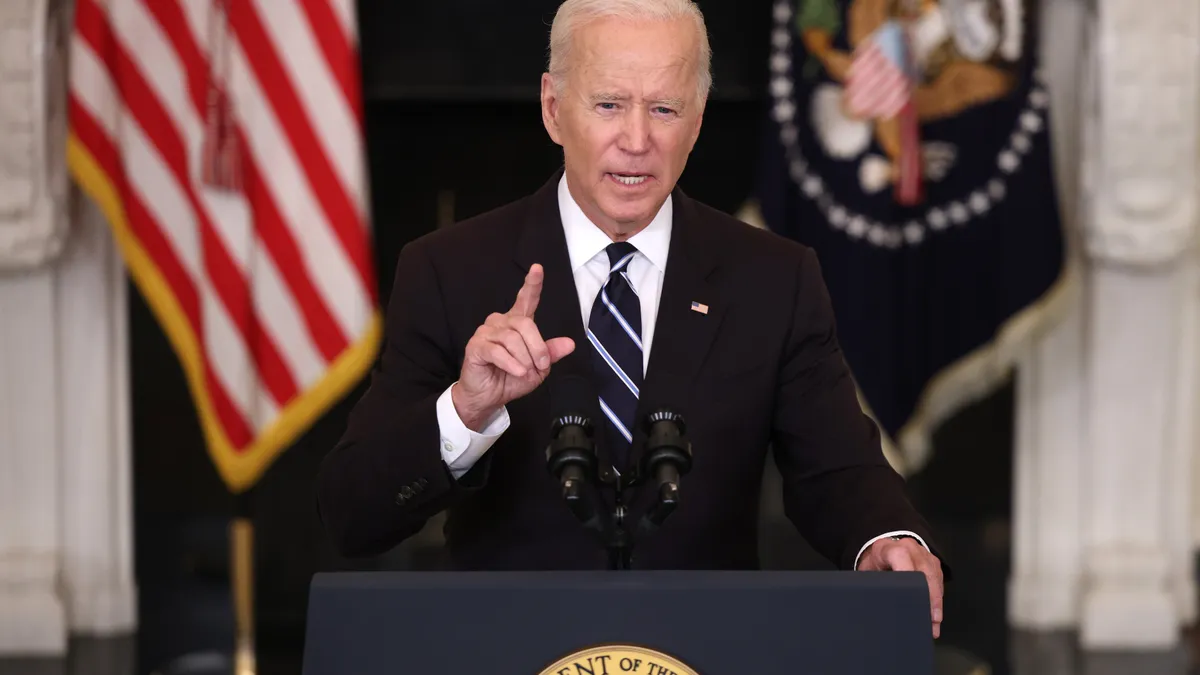Dive Brief:
- A 15% minimum global corporate tax announced Friday by 136 countries confronts three challenges to approval in the U.S., including its misalignment with some of the Biden administration’s own tax goals, according to the Tax Foundation.
- First, Senate Democrats, who hold a slim majority in the chamber, will likely face difficulty rallying Republicans and mustering the 67 votes required for a change to a tax treaty, the Tax Foundation said. The Biden administration says Democrats could pass the tax deal without Republican support by using a legislative process known as reconciliation.
- Second, President Biden has suggested a heavier tax on the foreign earnings of U.S. companies than the levies included in the new agreement. Finally, the agreement conflicts to a degree with the current Base Erosion and Anti-abuse Tax (BEAT) and the Global Intangible Low-Tax Income (GILTI), which is a minimum tax on foreign earnings of U.S. companies.
Dive Insight:
Treasury Secretary Janet Yellen worked for months in talks led by the Organization for Economic Cooperation and Development (OECD) to win support for an agreement overhauling global tax rules, shutting down tax havens and curtailing international tax competition.
The new tax regime will apply to companies with annual revenue exceeding 750 million euros ($867 million) and generate about $150 billion in additional annual tax revenue, according to the OECD.
The tax system will also reallocate $125 billion of profits from 100 of the world’s largest multinational companies to countries worldwide, “ensuring these firms pay a fair share of tax wherever they operate and generate profits,” the OECD said.
“Virtually the entire global economy has decided to end the race to the bottom on corporate taxation,” Yellen said in a statement on Friday.
The Biden administration believes the minimum global tax would shore up revenues for ambitious federal programs by discouraging companies from moving profits to low-tax jurisdictions.
“This deal is a victory for American families, who will benefit from the revenues this deal raises to pay for infrastructure, child care, and clean energy; it’s a win for American businesses, which will no longer have to compete on an international playing field tilted against them; it’s a victory for the international business community, which will enjoy a more stable and certain environment, with fewer tax and trade disputes; and it’s a victory for the members of Congress who have drafted their own international tax reform proposals,” Yellen said.
Congress will need to align the U.S. with the new tax system by increasing the tax that U.S. companies pay on foreign profits to at least 15% from 10.5%.
Yellen said she hopes Congress approves the global tax deal through reconciliation, which would require no Republican support.
Bypassing Republicans would be unconstitutional, according to an Oct. 8 letter to Yellen from Senators Mike Crapo (R-Idaho), James Risch (R-Idaho) and Pat Toomey (R-Pa.), ranking members of the finance, foreign relations and banking committees, respectively.
“Under the U.S. Constitution, a bilateral or multilateral tax treaty would require the advice and consent of the Senate, with a two-thirds vote of approval,” the Senators said. “The Senate Foreign Relations Committee, which has jurisdiction over treaty matters, has received no engagement from Treasury on this issue to date.”
The Group of 20 finance ministers will review the global tax deal on Wednesday prior to consideration by the Group of 20 at its summit in Rome beginning on Oct. 30. The global tax rate would take effect in 2023.















